MENOPAUSE matters
Scratch marks World Menopause Month by investigating the impact of menopause on nail health
JESS WATTS REPORTS
World Menopause Month
has been recognised in October since 2009, when the International Menopause Society (IMS), in collaboration with the World Health Organization (WHO), spearheaded menopause awareness by campaigning, holding events and sharing resources.
World Menopause Day
is 18 October, and this year’s theme is ‘Lifestyle Medicine’.
Lifestyle medicine is a multi-faceted approach to care, which focuses on ‘behaviour change through person-centred techniques’. This involves specific attention to lifestyle management, such as mental wellbeing, eating and exercise habits, and self-care. As key contributors to the self-care industry, it is important for nail professionals to be aware of the effects of menopause – both physical and emotional – and how it can impact services.
What is menopause?
Menopause is a hormonally induced stage of life that usually happens to women aged 45 to 55, but can happen earlier. Hormonal changes may induce physical and emotional symptoms, with the most well-known including hot flushes, mood changes, brain fog, irregular menstruation, headaches, muscle aches and skin and hair changes. Lesser-known, yet common symptoms of menopause involve changes in nail health, with many women reporting dry, brittle and weak nails.
“In the UK, menopause typically occurs between ages 45 and 55, with the average around 51,” says Claire Hattrick, founder of The Executive Menopause Coach website & author of
Menopause Help – Before, During, After
. “Onset can be influenced by genetics, but factors that can lead to early menopause include smoking, certain medical treatments (such as chemotherapy or pelvic radiotherapy), surgical removal of the ovaries, autoimmune conditions and some chronic illnesses.”
Science notes
There are three notable stages of menopause: perimenopause, menopause and post-menopause. According to the NHS, ‘perimenopause is when you have symptoms of menopause, but your periods have not stopped’. Menopause occurs when menstruation stops completely. When a person has not had a period for 12 months, they are post-menopausal.

Claire Hattrick
All three stages affect hormone levels, and thus physical and emotional health. “During menopause, the ovaries gradually stop releasing eggs and producing oestrogen, progesterone and testosterone hormones,” shares Claire Hattrick, aka The Executive Menopause Coach. “Progesterone declines first as ovulation becomes irregular, followed by fluctuating then falling oestrogen levels, which affect the brain, bones, skin and urogenital tissues. In response, the pituitary gland increases production of follicle-stimulating hormone (FSH) and luteinising hormone (LH), but the ovaries no longer respond.”
Claire notes the effect of menopause on nail health, commenting: “Declining oestrogen levels reduce collagen production and impair moisture retention in skin, hair and nails, which can make nails grow more slowly, become brittle and split or peel more easily. Reduced circulation and nutrient delivery to the nail matrix, along with potential deficiencies in biotin, zinc or iron, can further impact nail strength and appearance.”
Lisbon-based nail therapist, Sandra Remili, notes how hormonal changes can also indirectly impact natural nails: “A large number of women can experience a change in mood and a lack of sleep. This can impact their emotional balance and induce more anxiety or sadness, which can affect the condition of their nails. I have worked with several clients who, in the middle of perimenopause, began to bite their nails (onychophagia) or to tear off the skin around them (onychotillomania) when they had never done so before.”

Sandra Remili
Commonly prescribed medications, such as HRT, can also impact women in a multitude of ways. “Menopause medications can have a positive effect on skin and bones, therefore potentially nails, by counteracting the effects of declining oestrogen,” Sandra continues. “By restoring oestrogen levels, HRT encourages production of keratin and collagen, improving skin hydration and elasticity.” Sandra also notes: “These medications can have side effects, and it is important to have medical supervision for an individualised benefit-risk assessment, as well as regular medical follow-ups.”
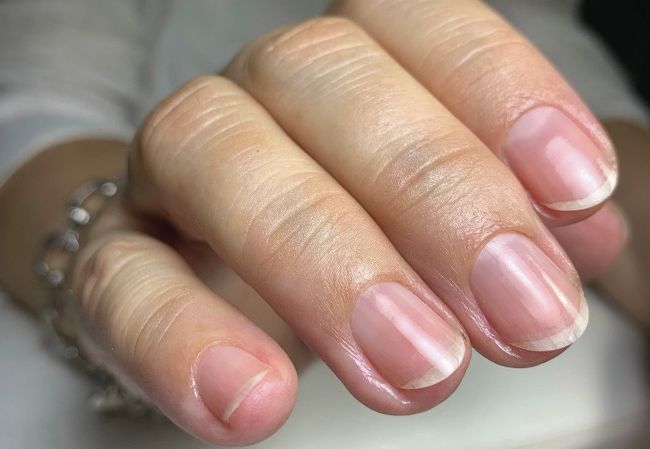
Nails by Sandra Remili for Maria, a 60-year-old client who receives a Japanese manicure every three weeks. She moisturises and oils her nails regularly, has a balanced lifestyle and wears gloves while cleaning, in order to maintain good nail health.
How can nail techs support menopausal clients?
Scratch
spoke to pros with clients in varying stages of menopause, who share their nailcare tips.
“The most common concerns from menopausal clients include brittle or splitting nails, vertical ridges, slow growth, dryness and lifting,” shares Katie Brown, owner of Sparkle Nails, Kent. The nail pro recommends regular manicures, commenting: “Avoid harsh filing and minimally etch the nail plate, ensuring the focus stays on hydration, protection and strengthening, rather than frequent removal and reapplication.” For everyday damage prevention, Katie advises wearing gloves for cleaning or gardening, moisturising hands and nails daily, keeping nails short to prevent snagging, staying hydrated and avoiding prolonged water exposure and harsh chemicals.
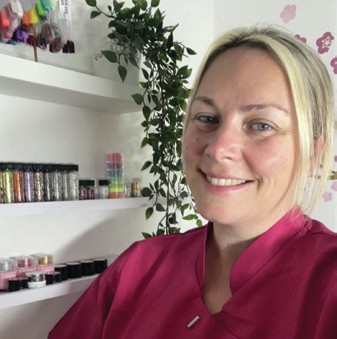
Katie Brown
“The nails pictured were once brittle, weak and peeling due to HRT,” Katie reveals. “Over three months, their condition improved, as I applied The Nail Grail by CJP before a base coat at each appointment.”
The Nail Grail by CJP £12.49 + VAT www.cjpnailsystems.com
Mandie Foster of Mandie Foster Nails in Grand Falls, Canada, highlights the benefits of prescriptive nailcare.:“It’s not about doing ‘more’, but about offering the right kind of care every few weeks. Clients need to maintain regular appointments and commit to aftercare.” Mandie emphasises the importance of hydration, stating: “Cuticle oil is essential.” She recommends products containing jojoba oil and vitamin E to help nourish nails.
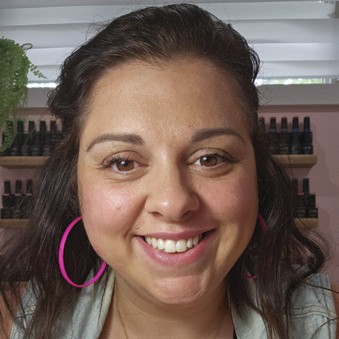
Mandie Foster
Aurelija O’Neill, owner of Starry Room Beauty nail and piercing studio, Dublin, shares that many people don’t know about the nail implications of menopause. “Sometimes, a client will present brittle nails, or share that nail products don’t last and they don’t know why,” she comments. “That’s when we try to identify the cause and possible solutions. Often, clients simply don’t realise that certain nail conditions could be caused by the hormonal changes of menopause.
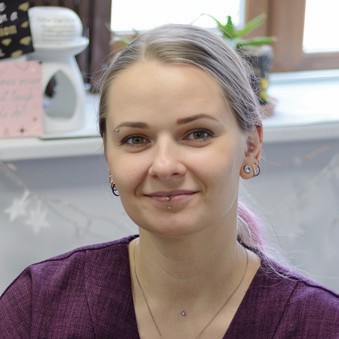
Aurelija O’Neill
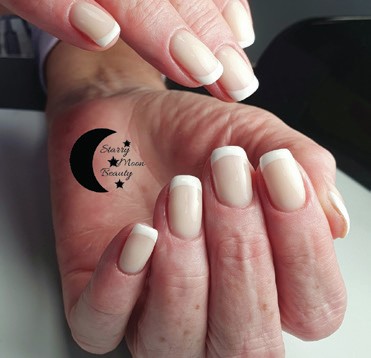
Nail enhancements by Aurelija O’Neill for a menopausal client.
“It is important that women voice their concerns, no matter how big or small they may seem,” Aurelija continues. “Sometimes, a small thing that a client points out to a nail tech might lead to a conversation that could nudge them towards a GP and menopause assessment.” Aurelija helps clients feel more confident by understanding and catering to specific nail needs. For those affected by the menopause, she often uses builder gel to support the natural nail and aid strength.
Encourage clients to track their nail health by taking photographs and making notes of fluctuations. “Documenting visible changes can help track improvement or decline over time,” advises Claire Hattrick. This evidence can be used to plan suitable future treatments.

Kristen Desai
Product pointers
Kristen Desai, head of education at Mii Cosmetics, offers advice and product recommendations for strengthening and rehydrating nails affected by menopause.
• Daily cuticle care. “This can help replenish and retain hydration, ensuring nails look and feel their best. Mii’s Refine + Pamper Intensive Cuticle Cream is ideal for those who prefer a lotion formula over an oil. Encourage clients to use regularly for best results.”
• Strengthening, prescriptive base coats. “Every woman’s nails can be affected differently during menopause, so a prescriptive base coat can protect nails. Take the time to properly assess the client’s nail type and recommend the most suitable base coat to support their needs.”

Mii Cosmetics Refine + Pamper Intensive Cuticle Cream from £7.50 + VAT/RRP £15
www.miicosmetics.com

Mii Cosmetics Care + Caress Hand Serum from £14.50 + VAT/RRP £29
www.miicosmetics.com
• Deeply hydrating hand creams and serums. “These help restore the skin’s barrier function and prevent dryness around the nails. Mii Care + Caress Hand Serum offers a concentrated and deeply nourishing formula that softens, smooths and firms the skin, helping to rejuvenate and restore a more youthful appearance. It is lighter than a typical hand cream, so absorbs more quickly and penetrates deeper into the skin. Pair with Mii’s Soft + Supple Hand Cream to deliver best results.”

Mii Cosmetics Neat + Tidy Emery Boards for Soft, Thin, Peeling Nails from £1.75 + VAT/RRP £3.50
www.miicosmetics.com
• Gentle nail filing. “Minimise damage to weak nails by using Mii Neat + Tidy Emery Boards for Soft, Thin, Peeling Nails with a gentle technique to help prevent splitting.”

OPI Repair Mode
TM £18.90 + VAT/RRP £29.90
uk.wella.professionalstore.com
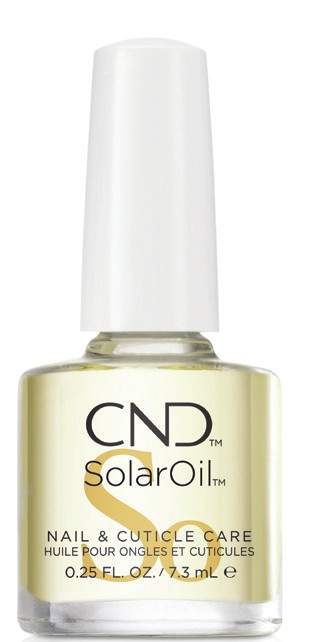
CND SolarOil™ £4.95 + VAT/RRP £11.95
www.sweetsquared.com
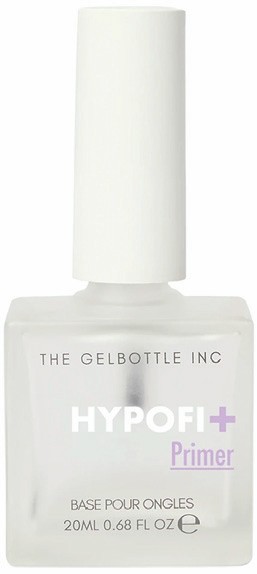
The GelBottle Inc HypoFix™ Nailcare System £32.90 + VAT
www.thegelbottle.com
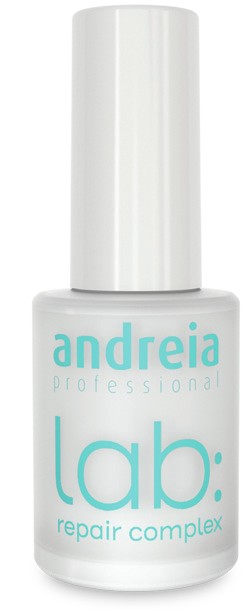
Andreia Professional LAB: Repair Complex £3.49 + VAT
www.andreiaprofessional.comwww.salon-services.com

Glitterbels Almond Cuticle Oil £9.99 inc VAT
www.glitterbels.com
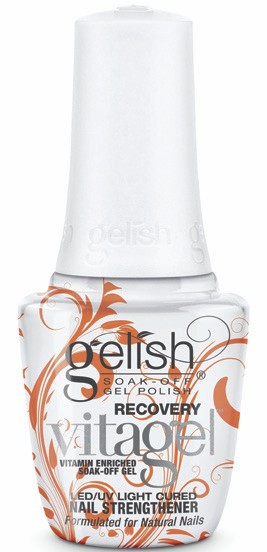
Gelish VitaGel Recovery Nail Strengthener £19.99 + VAT
www.gelishmorgantaylor.co.uk

Halo Elite Half-Moon Zebra File 240/240-grit (5pk) £7.04 + VAT
www.purenails.co.uk


Environmental aids
Though a trip to the nail salon can be a wonderfully relaxing experience, many women experiencing menopause symptoms struggle to feel comfortable when out and about. Consider the following to help curate the best environment for clients:
• Temperature: Hot flushes may be experienced during menopause. Offer clients the opportunity for cool air – whether through air conditioning, opening a window or ensuring they know they can step outside to cool down, when needed.
• Furniture: Muscle aches are a common symptom of menopause. Support client client comfort with a comfortable hand rest and seat, and offer a cushion if desired.
Adriana Tomas, quality assurance & regulatory affairs officer at Andreia Professional, says that providing a compassionate environment ‘gives clients the chance to express their needs without pressure, even if they don’t wish to discuss menopause directly’. She suggests that salons train staff to ‘listen closely, adapt services discreetly and maintain empathy’ for the optimum client experience.

Adriana Tomas
Research has shown that around 66% of women experience brittle nails during menopause. This is likely linked to low oestrogen levels impacting keratin production.
Lifestyle level-up
Claire Hattrick recommends the following lifestyle changes to help aid nail, skin and hair health during menopause:
• Balanced diet: Include protein, vitamins (biotin, A, C, D and E), minerals (zinc, iron and selenium) and omega-3fats to support keratin and collagen production.
• Hydration: Adequate water intake helps maintain nail and skin moisture.
• Limit smoking and alcohol: These can accelerate dryness, brittleness and ageing.
• Regular exercise: This improves circulation, delivering nutrients to skin, hair and nails.
• Gentle care routines: Avoid harsh chemicals and excessive water exposure and moisturise nails, cuticles and skin regularly.
• Stress management: High stress can worsen hair thinning and brittle nails, so practices like yoga or meditation may help.
Early menopause affects a huge number of women, with ‘1 in 100 experiencing menopause impact before the age of 40’, according to the UK Government’s
No Time to Step Back: The Government’s Menopause Employment Champion
policy paper.
HANDY RESOURCES
British Menopause Society:
www.thebms.org.uk
British Society of Lifestyle Medicine:
www.bslm.org.uk
NHS:
www.nhs.uk/menopause
The Executive Menopause Coach:
www.theexecutivemenopausecoach.com
Women’s Health Concern:
www.womens-health-concern.org
World Health Organization:
www.who.int